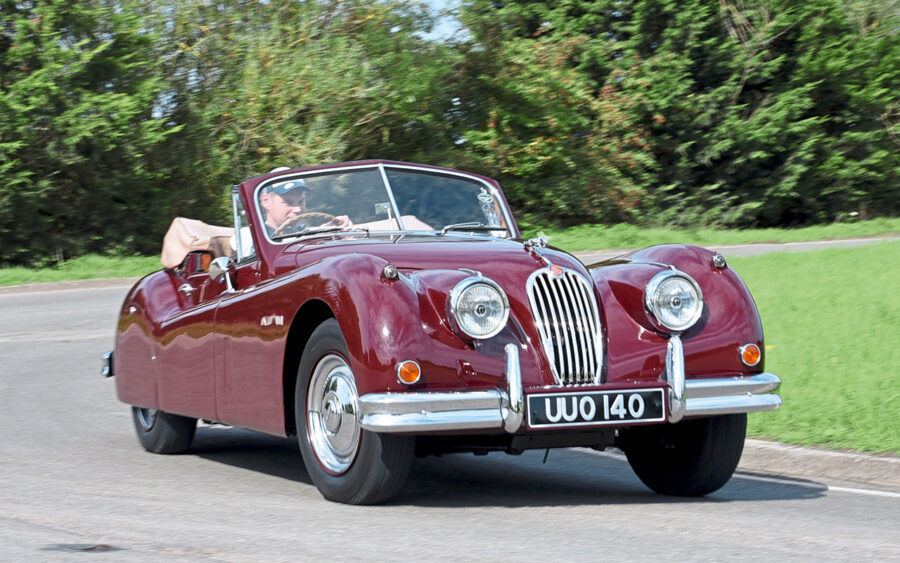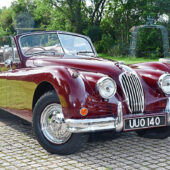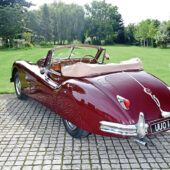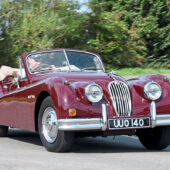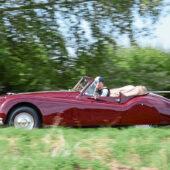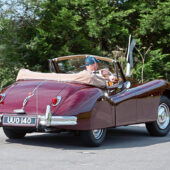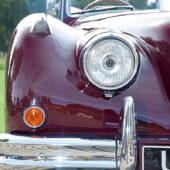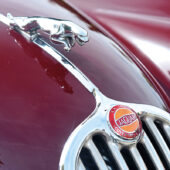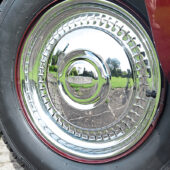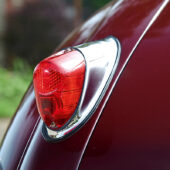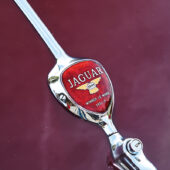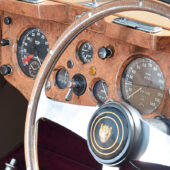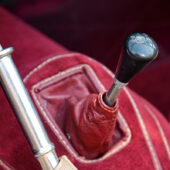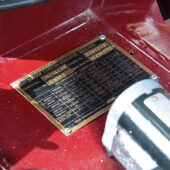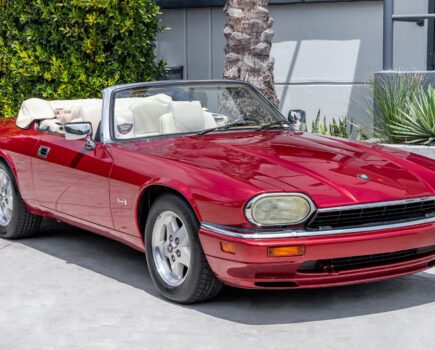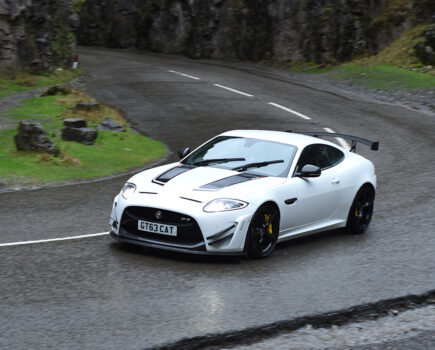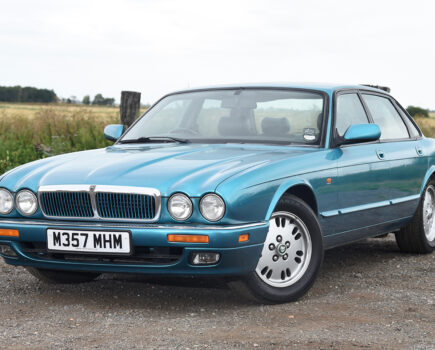This 1956 XK140 was restored over a 19-year period resulting in a perfectly presented example. We get behind the wheel
Words and images: Paul Walton
The first owner of this 1956 XK140 drophead coupe owned the car for 62 years. To put that into perspective, when he first took delivery of the car, Sir Anthony Eden was still prime minister. When he sold it in 2018, 12 premierships had come and gone and Theresa May was half-way through her three-year term.
But after seeing the car for myself, it’s easy to understand this extended ownership. Elegant and graceful yet offering all the performance the XK range was famed for, I can imagine when that first owner ordered it in the mid-Fifties it was their ultimate car yet despite how often the country would change its prime minister over the next 60 years, this view clearly didn’t.
Together with the open-two seater and fixed head coupe, the drophead coupe was part of the XK140 family from its debut at the 1954 Earls Court Motor Show in October. Just as the original XK120 version had done, the XK140 DHC offered all the luxury of the FHC – including walnut veneer on the dash, door frames with winding windows and a more comprehensive roof – yet still having the wind-in-the-hair thrills of the more basic roadster.
This example – chassis number 807342DN – was built in late 1955 and delivered to the first owner’s Devon home through Henlys of London early the following year. This would be the start of a long but clearly frustrating relationship.
Repainted blue at some over the subsequent 16 years, in September 1972 the owner decided to return it to its original maroon, taking nine months to take it back to a bare shell. The following October the body was lifted from the chassis and taken to a local garage where it received a full mechanical strip down. The chassis was also shotblasted and repainted while the engine and gearbox were removed and rebuilt.
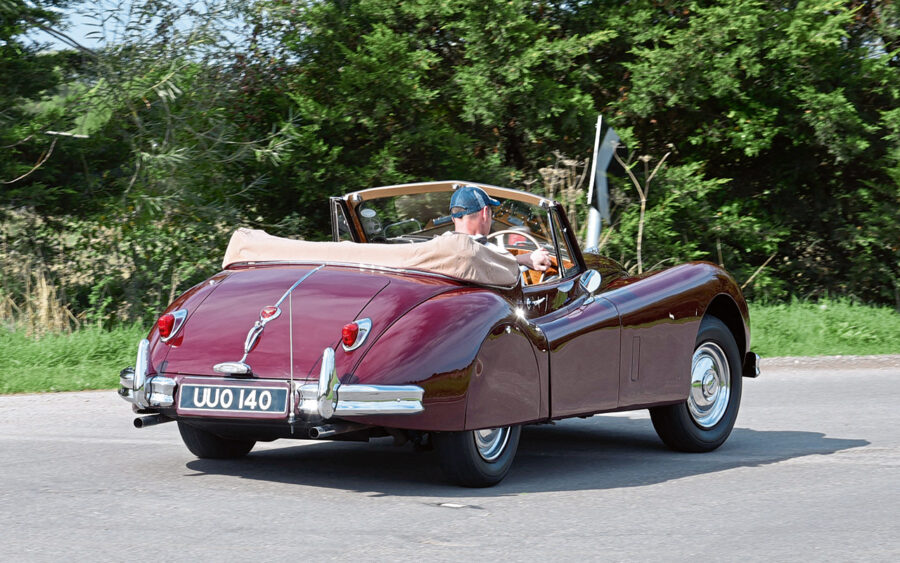
Whether it was due to a lack of money, time or both the repainting took 17 years to complete with the final layer of maroon not applied until 1989 when the engine was also removed once again and rechecked.
After the owner received the restored body and running chassis in October 1989 to start the rebuilding process, the interior was sent to the trimmers where over six weeks the original leather was replaced plus a roof lining and hood fitted.
The car was only finished on May 18 1991, almost 19 years since the restoration had started. To the delight of the owner, the Jaguar soon won Best Sports Car at a local classic car show.
He would keep the XK140 for a further 27 years, only selling in 2018 to another Jaguar enthusiast who wanted something more comfortable for touring than his existing XK120 OTS. Other than disc brakes fitted by marque specialists, the South Yorkshire-based M&C Wilkinson, by having just two owners, the car is a largely original and unmodified example of an XK140 DHC.
A good example of this are the wheels. While most XKs now sit on the more rakish-looking wires, this one still has the original steels that are shod with chrome finishers which also means it’s kept the rear spats. Although considered by many today as old-fashioned, they add to the drophead coupe’s already elegant lines and in my eyes make it similar in appearance to the MkVII especially in this regal shade of maroon.
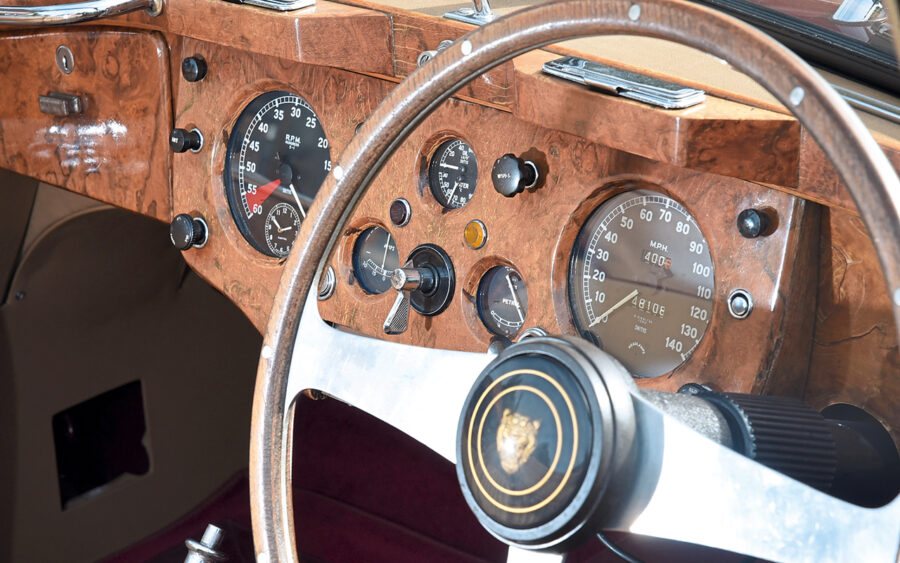
With the sun shining and the roof already lowered, it’s time to take this beauty for a spin. Although Jaguar moved the XK140’s engine forward by three inches in the frame to create more interior room, due to the position and size of the steering wheel, it’s still a tight squeeze to get behind it. And then, due pedals’ close proximity to each other, I also should have worn my ballet shoes rather than big clunky walking boots and I’m worried when I’ll press the brake I’ll get the clutch and vice versa. Yet once inside it’s comfortable, the thick veneer covering the dash and the chrome window surrounds making it feel more luxurious than the austere XK140 open-two seater I drove previously.
The 3442cc XK unit churns instantly into life the moment I hit the starter button and after snicking the tall lever up into first and releasing the clutch, I head into the beautiful South Yorkshire countryside that surrounds Sayer Selection where the car is currently for sale.
Jaguar gave the XK140 the same engine as previous XK120 SE that had high lift cams, a special crankshaft damper and 8:1 compression ratio. With 190bhp, the performance is strong and robust, the always free-revving straight-six needing little coaxing to deliver its power. But the large boot badge celebrating Jaguar’s two Le Mans victories in 1951 and 1953 is a subtle reminder of what the XK engine is capable of.
As I gun it even harder, I’m immediately rewarded by the characteristic twin-cam growl which, together with the view down that long, curvaceous bonnet, is what makes driving these cars such a delight. Plus, thanks to the DHC’s side windows, there much less wind in the cabin than that more exposed OTS meaning it’s still possible to have a conversation without needing to shout.
The car is still fitted with the original four-speed Moss box yet despite its reputation for awkwardness, I’ve learned by taking it slow and steady I can change without grinding the gears. The XK140 was also the first Jaguar sports car to have the option of the same Laycock-de-Normanville overdrive as the MkVII which this car has been fitted with. Often described as a fifth gear, after flicking the switch to the right of the fascia, the revs reduce a little making the engine feel smoother and sound quieter.
Another update the XK140 received over its predecessor was the adoption of rack and pinion steering. Sharper than the XK120’s old-fashioned Burman recirculating ball system, there’s little of the vagueness the earlier model suffers from allowing me to scythe accurately through corners while the disc brakes have more bite than the original drums would have done.
Yet despite its obvious racing pedigree, performance driving isn’t what the XK140 drophead coupe excels at; it’s for gently coasting through beautiful countryside on a sunny day.
And as a perfectly preserved example, this maroon car does this perfectly, making it even easier to understand why that first owner kept it during the terms of so many prime ministers.

